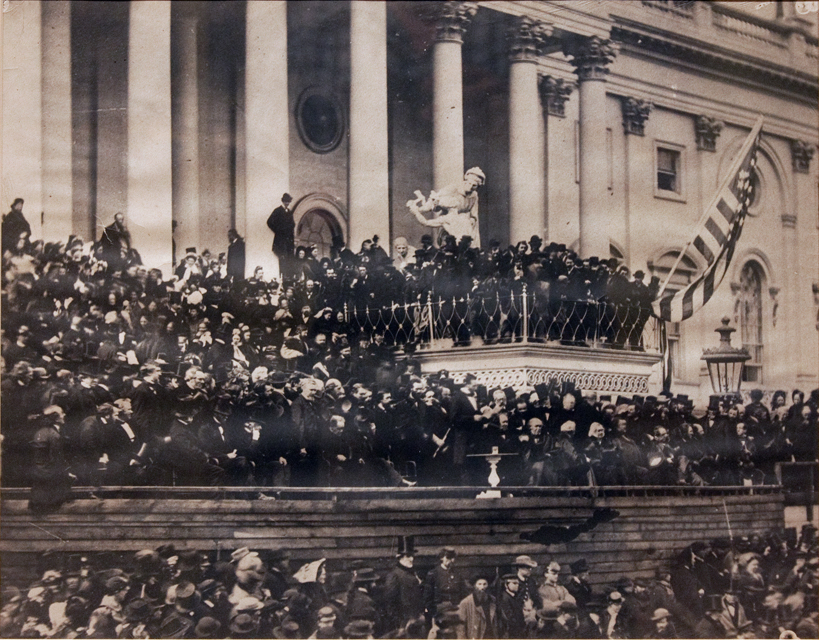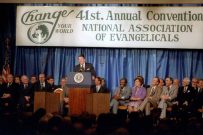Lincoln's 700 Words of Biblical Meditation
A hundred and fifty years ago today, as the sun broke through the clouds shortly after noon on a wet Washington day, Abraham Lincoln, with one hand raised and the other on an open Bible, took the presidential oath of office for the second time. The speech he just gave had been received by an enthusiastic crowd on the East Portico of the U.S. Capitol. It took about six minutes. Then the oath. Then he said, “So help me God,” bent forward, and kissed the Bible to conclude the solemn ceremony.
Delivered in the waning days of a devastating national conflict that claimed the lives of an estimated 750,000 men, the Second Inaugural Address is widely considered among the most eloquent of all presidential utterances. Lincoln himself considered it one of his finest speeches, telling Thurlow Weed it was “perhaps better than . . . anything I have produced.” It is also among the shortest inaugural addresses, a little over 700 words in length. It is a model of profound simplicity.
Lincoln’s Second Inaugural, like the dedication he gave at Gettysburg’s battlefield a year and a half earlier, resounds with Biblical rhythms, phrases, and themes. Its author was well acquainted with the English Bible—specifically the King James Bible. Those who knew him best reported that he had an intimate and thorough knowledge of the Scriptures and was known to commit lengthy passages to memory. His biographer and friend of a quarter century, Isaac N. Arnold, recalled that Lincoln “knew the Bible by heart. There was not a clergyman to be found so familiar with it as he.”
American politicians have long deployed Biblical language in their public discourses because, as an authoritative and sacred text, its mere invocation lends rhetorical weight to their words. Such language stirs an audience’s imagination. Civic uses of Scripture, which sometimes mimic pulpit oratory, are meant to tap into a righteous passion (perhaps even a fear of God), project an aura of transcendence and truth, or underscore an argument’s moral implications. In the Second Inaugural, Lincoln also drew on Scripture to gain insights on the character and purposes of God, especially as they pertain to His providential involvement in history.
America has produced no political figure more adept in appropriating the distinct cadences and vernacular of the King James Bible than Abraham Lincoln. Another Lincoln biographer, William E. Barton, observed that Lincoln
read the Bible, honored it, quoted it freely, and it became so much a part of him as visibly and permanently to give shape to his literary style and to his habits of thought.
He was not the first President to consider the place of providence in the life of the nation. A third of George Washington’s First Inaugural Address, for example, was devoted to a reflection on the “providential agency” at work in the nation’s Founding. “These reflections, arising out of the present crisis,” Washington declared, “have forced themselves too strongly on my mind to be suppressed.” John Quincy Adams was the first President to quote directly from the Scriptures in an inaugural address, and he did so in a closing prayer (drawing from Psalm 127:1) for divine favor and an “overruling providence.”
Lincoln’s, though, was a more nuanced and searching reflection on the role of providence in the affairs of nations. He routinely incorporated into his political prose direct quotations from and allusions to the Bible, as well as phrases and rhythms resembling the distinctive language of the Jacobean Bible.
In the 700 words he offers on March 4, 1865, he does both. Unlike the Gettysburg Address, replete with Biblical language and themes but containing no direct Biblical quotations, the Second Inaugural has at least 45 words that are direct or approximate quotations from the King James Bible. Several phrases are unquestionably borrowed from the Jacobean Bible, such as “bind up the nation’s wounds” (cf. Psalm 147:3) and care for the widow and orphan (cf. James 1:27; Isaiah 1:17). The speech mentions the Deity 14 times and prayer three times.
Among the assembled throngs at the Capitol that day was the former slave Frederick Douglass. As Douglass famously quipped, the President’s address “sounded more like a sermon than a state paper.” More recently, religious historian Ronald C. White, Jr. called it Lincoln’s “Sermon on the Mount.”
The speech opens a window into how Lincoln had come to view and understand God, the work of divine will and providence in history, and the war that had torn the nation asunder. In Lincoln’s Greatest Speech: The Second Inaugural (2002), Ronald C. White, Jr. argued that
God’s providence is the prism through which [Lincoln] carefully refracted the meaning of the war. Lincoln points beyond himself and his generals to God as the primary actor in the war.
The speech is premised on a belief in a superintending providential agent Who is firmly in control of the affairs of men and nations, and dispenses judgment and facilitates reconciliation according to His divine plan and will. The devastating conflict that engulfed the continent during the preceding four years could only be understood in the light of God’s will.
But how does one understand God’s will in the context of civil strife, given that, as Lincoln says midway through, Northerners and Southerners alike “read the same Bible, and pray to the same God; and each invokes His aid against the other”? Pondering this problem signals an intent, perhaps, to speak about the nation’s plight less as the commander-in-chief and more as theologian-in-chief. Only such themes—sin, judgment, atonement, redemption, restoration—are adequate to approach events so sweeping and so tragic.
“It may seem strange,” Lincoln says, that men would have the temerity “to ask a just God’s assistance in wringing their bread from the sweat of other men’s faces.” This is a reference to mankind’s fall and God’s punishment for sin in Genesis 3:19. Lincoln has rephrased the Biblical text to emphasize the moral offense of slavery. The sweat of one’s brow is the source of one’s property. In Lincoln’s rendering, it is sinful to deny another (that is, the slave) the fruits of his labor. Herein lies the sin of slavery.
Lincoln does not linger long on this point before somewhat unexpectedly pivoting to Jesus’s instruction from the “Sermon on the Mount” to “judge not, that ye be not judged” (Matthew 7:1). In a slight revision, Lincoln inserts “let us” judge not, and replaces the Biblical “ye” with “we,” suggesting that blame for the sin of slavery extends beyond the Southern states. And this injunction is the hinge that will later turn the oration toward its finishing expression of reconciliation, “With malice toward none; with charity for all.”
Before reaching that resolution, though, he explores the consequences of this sin. He first acknowledges that “the Almighty has His own purposes,” which, once again, underscores God’s place at the center of his analysis. He follows this with another of Jesus’s sayings: “Woe unto the world because of offences! for it must needs be that offences come; but woe to that man by whom the offence cometh!” (Matthew 18:7; see also Luke 17:1.)
Dispensing judgment is among the purposes that believers ascribe to the Almighty, Lincoln observes. He says that “American Slavery” is “one of those offenses” that is surely followed by “woe,” or punishment: the incalculable carnage and death of the “terrible war.” The war, in short, is divine judgment on “both North and South” for the offense. Then, in words surely discomfiting to his audience, he says that God’s will may yet require more shed blood before “this mighty scourge of war . . . pass[es] away.” Lest we complain about the horrible punishment God inflicts upon the nation for this offense, Lincoln recalls, in the words of Psalm 19:9, “the judgments of the Lord are true and righteous altogether.”
That Lincoln calls it “American Slavery” and not Southern slavery, sparing no American from blame, contrasts with his opening assertion that the “peculiar and powerful interest” of slavery, localized in the Southern states, was the “cause of the war.” As historian Mark A. Noll has written, Lincoln invoked Scripture in this speech “in order to make a profound public statement about the superiority of divine providence over any partisan grasp of God’s will.”
Previously, with the conflict dragging on and its human and material costs mounting, Lincoln had many times asked searching questions about why God had allowed a “terrible war” of such “magnitude” and “duration.” In a private 1862 meditation on “divine will,” widely regarded by historians as anticipatory of the themes in the Second Inaugural, Lincoln had written that each side in a great contest “claims to act in accordance with the will of God.” But it is not possible that both could do so: “In the present civil war it is quite possible that God’s purpose is something different from the purpose of either party.” The one thing that can be said with certainty is that “the will of God prevails.” Or, as he expressed it in September 1864 in a letter to Eliza P. Gurney, the perfect yet inscrutable will and ways of providence escape the ability of “erring mortals . . . to accurately perceive them.”
Lincoln had suggested in the Gettysburg Address, and it may be implied here, that in the atoning shed blood of this war, the old Union—corrupted by slavery—died, giving hope for a new birth and new life for the Union. Shifting his focus to the future, Lincoln concludes with a humble, poetic plea to a people divided and devastated by war to eschew triumphalism and vindictiveness in victory and acrimony and recrimination in defeat:
With malice toward none; with charity for all; with firmness in the right, as God gives us to see the right, let us strive on to finish the work we are in.
He calls on his countrymen to “bind up the nation’s wounds” and to care for those left by the war fatherless and widowed. For only through the difficult work of reconciliation can there ever be a “just and lasting peace.”


